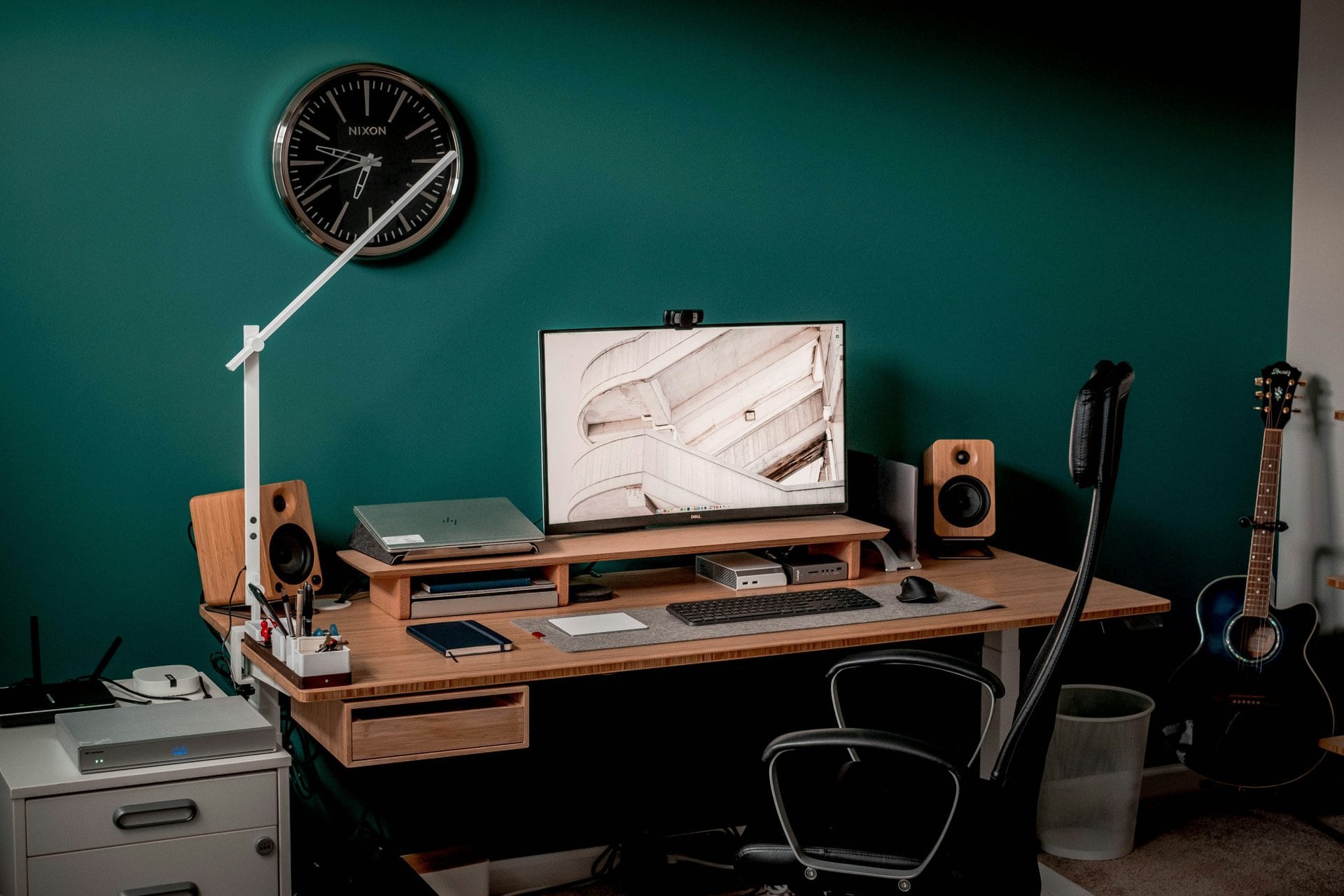L’Art de l’Alignement : Guide de l’Ergonomie au Bureau
Transformez votre espace de travail d’une source de tension en un sanctuaire de productivité. Les clés pour un confort durable et une concentration optimale en 2025.
Un bureau bien configuré est la pierre angulaire de toute journée de travail productive. C’est là que vos projets prennent vie. Pourtant, un mauvais alignement peut entraîner fatigue, inconfort et baisse de performance. Atteindre une symbiose parfaite entre votre corps et votre poste de travail ne relève pas du luxe, mais de la nécessité. Ce guide vous présente les principes fondamentaux de l’ergonomie pour vous aider à bâtir un environnement de travail sain, confortable et performant.

Les Piliers d’une Bonne Ergonomie : En Bref
La Posture Neutre
L’alignement est la clé. Apprenez à ajuster votre chaise, écran et clavier pour soutenir la courbe naturelle de votre colonne.
Les Habitudes Actives
Le corps a besoin de bouger. Intégrez des micropauses et organisez votre espace pour réduire les gestes inutiles et la fatigue.
L’Équipement Adapté
Les bons outils font la différence. Découvrez les équipements essentiels qui préviennent les tensions et maximisent le confort.
Partie 1 : Les 4 Fondamentaux à Régler Aujourd’hui
Avant même de penser à des gadgets, la maîtrise des réglages de base est primordiale. Ces quatre ajustements constituent 80% d’une bonne ergonomie et ne coûtent rien à mettre en place.
1. L’Assise : Votre Fondation
Réglez la hauteur de votre siège pour que vos pieds soient à plat, genoux à 90°. Votre dos, surtout la région lombaire, doit être bien soutenu. Réglez les accoudoirs pour que vos épaules soient basses et détendues, et non haussées.
2. L’Écran : L’Alignement du Regard
Le haut de votre moniteur doit être au niveau de vos yeux. Maintenez une distance d’un bras entre vous et l’écran. Si vous utilisez un ordinateur portable, un support externe est non négociable pour le surélever.
3. Clavier & Souris : La Zone de Frappe
Vos coudes doivent rester près du corps (angle 90-110°). Positionnez le clavier et la souris bien en face de vous pour garder vos poignets droits, évitant ainsi de les “casser” ou de vous étirer pour atteindre vos outils principaux.
4. Mouvement : Le Principe Actif
La meilleure posture est la prochaine. Appliquez la règle du 20-20-20 et levez-vous au moins une fois par heure. Intégrez des micro-étirements : rotations du cou, des poignets et des épaules pour réactiver votre corps.
Partie 2 : Au-delà des Réglages, les Habitudes Durables
Une installation parfaite ne sert à rien sans les bonnes habitudes. L’ergonomie est une pratique quotidienne qui englobe votre environnement et vos rituels, bien au-delà de la simple posture.
Optimisez Votre Environnement Visuel
La fatigue oculaire est un ennemi silencieux de la productivité. Pour la combattre, placez votre bureau perpendiculairement aux fenêtres pour éviter les reflets sur l’écran. Complétez la lumière naturelle par un éclairage d’appoint de bonne qualité. Pensez également à régler la luminosité de votre écran pour qu’elle corresponde à celle de votre environnement et activez le filtre de lumière bleue en soirée.
Organisez Votre Bureau par Zones d’Atteinte
Minimisez les torsions et les étirements inutiles en organisant votre espace de manière logique.
- Zone 1 (Primaire) : Juste devant vous. Contient les outils d’usage constant : votre clavier et votre souris.
- Zone 2 (Secondaire) : À portée de main. Pour les objets d’usage fréquent : téléphone, carnet, bouteille d’eau.
- Zone 3 (Tertiaire) : Accessible en vous levant. Pour les archives, l’imprimante, etc.
Le Télétravail : Créer une Frontière Claire
À la maison, la frontière entre vie professionnelle et personnelle peut s’estomper. Il est crucial de dédier un espace au travail. Ce “sanctuaire” aide votre cerveau à se mettre en mode “focus”. Plus important encore, instaurez un rituel pour “terminer la journée” : rangez votre bureau, fermez votre ordinateur. Ce signal de fin est essentiel pour vous déconnecter et préserver votre équilibre.
Partie 3 : L’Équipement Essentiel (Sans Images)
Une fois les bases maîtrisées, certains équipements peuvent transformer radicalement votre confort et votre productivité.
La Chaise Ergonomique
Un investissement essentiel. Une bonne chaise ergonomique offre un soutien lombaire réglable et favorise une posture saine durant de longues heures.
Voir notre guideLe Bureau Assis-Debout
L’outil ultime contre la sédentarité. Un bureau assis-debout permet d’alterner les positions, améliorant circulation, énergie et concentration.
Voir notre guideLe Bras d’Écran
Il permet un ajustement précis de la hauteur, profondeur et angle de votre écran. Un bras articulé libère aussi un espace précieux sur le bureau.
Voir notre guideClavier & Souris Ergonomiques
Conçus pour réduire la tension, un bon ensemble clavier et souris prévient les troubles musculo-squelettiques (TMS).
Voir notre guideLe Verdict Final
Investir dans l’ergonomie, c’est investir dans votre bien-être et votre performance. Commencez par maîtriser les réglages de base de votre installation, puis ancrez des habitudes de travail saines comme le mouvement régulier et l’organisation de votre espace. Une fois ces fondamentaux en place, l’ajout d’équipements adaptés comme une chaise de qualité ou un bureau assis-debout décuplera les bénéfices. En considérant votre espace de travail comme un écosystème au service de votre corps, vous construisez les fondations d’une carrière plus saine, plus confortable et plus productive.



Leave a Reply